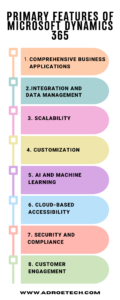In the ever-evolving landscape of enterprise technology, businesses must navigate a complex web of solutions to optimize their operations. One solution that consistently emerges as a transformative force is Dynamics 365 ERP by Microsoft. This dynamic software suite offers a comprehensive range of tools designed to streamline and enhance critical aspects of business operations. In this extensive guide, we will delve into the depths of Dynamics 365 ERP, uncovering its multifaceted capabilities, and exploring how it can revolutionize the way organizations manage their resources and data.
What is Dynamics 365 ERP?
Dynamics 365 ERP represents an integration of cutting-edge technology solutions, primarily engineered to assist organizations in effectively managing their day-to-day operations. At its core, it is an Enterprise Resource Planning (ERP) system, designed to optimize resource allocation, financial management, and data-driven decision-making. Let’s explore the key components and functionalities that constitute the DNA of this powerful ERP solution.
The Multifaceted Nature of Dynamics 365 ERP
1. Financial Management
One of the central pillars of Dynamics 365 ERP is financial management. It offers a comprehensive suite of financial tools to track, manage, and analyze your organization’s financial health. From budgeting and forecasting to accounts payable and receivable, Dynamics 365 ERP ensures a robust financial foundation.
2. Supply Chain Management
Efficient supply chain management is paramount in today’s fast-paced business world. Dynamics 365 ERP empowers organizations with tools for inventory management, procurement, and demand forecasting.
3. Human Resource Management
Human capital is a valuable asset, and Dynamics 365 ERP recognizes this. With human resource management features, it facilitates workforce optimization, talent acquisition, and comprehensive employee data management.
4. Project Management
For businesses heavily reliant on projects, the ERP solution offers a robust project management module. It enables businesses to effectively manage projects, allocate resources, track progress, and ensure projects are delivered on time and within budget.
5. Analytics and Reporting
In an era dominated by data, Dynamics 365 ERP provides robust analytics and reporting capabilities. It aggregates data from various departments and provides insights for informed decision-making.
6. Business Intelligence
The ERP solution incorporates business intelligence tools, such as dashboards, key performance indicators (KPIs), and data visualization, to facilitate data-driven decision-making.
Navigating the Dynamics 365 ERP Landscape
To harness the full potential of Dynamics 365 ERP, businesses must understand its diverse ecosystem, which includes:
Microsoft Dynamics 365 Human Resource
- A comprehensive solution tailored to small and medium-sized businesses, offering financial management, supply chain, and more.
Dynamics 365 Finance and Operations
- A versatile platform designed for larger enterprises, providing advanced capabilities in finance, supply chain management, and manufacturing.
Dynamics 365 Human Resources
- Focused on workforce management, this module is essential for managing employee data and HR processes.
Dynamics 365 Customer Engagement
- While not strictly part of the ERP suite, it complements it by managing customer relationships, sales, and marketing activities.
Benefits Galore: Why Choose Dynamics 365 ERP
Streamlined Processes
Dynamics 365 ERP significantly streamlines various business processes, ensuring that day-to-day operations are efficient and effective. This leads to reduced manual effort, minimized errors, and a better allocation of resources.
Scalability
As businesses evolve, so do their needs. Dynamics 365 ERP is inherently scalable, allowing organizations to add or modify modules as their requirements change.
Data-Driven Decisions
The ERP solution excels at data management and analysis. This enables organizations to make informed decisions based on real-time data, fostering agility and adaptability.
Enhanced Customer Relationships
By integrating customer relationship management (CRM) capabilities, Dynamics 365 ERP enables businesses to better understand and serve their customers.
Regulatory Compliance
In an increasingly regulated business environment, adhering to industry-specific regulations is crucial. Dynamics 365 ERP provides tools to ensure compliance, reducing legal risks.
Dynamics 365 ERP: Real-World Applications
The versatility of Dynamics 365 ERP is illustrated through its applicability in various industries:
Manufacturing
For manufacturers, Dynamics 365 ERP facilitates efficient production scheduling, materials management, and quality control.
Retail
Retailers benefit from improved inventory management, point-of-sale integration, and customer insights.
Healthcare
In the healthcare sector, the ERP system aids in patient data management, billing, and compliance with healthcare regulations.
Professional Services
Professional services firms use Dynamics 365 ERP for project management, resource allocation, and time tracking.
Education
Educational institutions leverage the ERP solution for student data management, academic planning, and financial control.
Dynamics 365 ERP and Microsoft’s Commitment to Innovation
Microsoft’s commitment to innovation and constant improvement is evident in Dynamics 365 ERP. The solution receives regular updates and enhancements to adapt to the ever-changing business landscape. This proactive approach ensures that users always have access to the latest tools and technologies.
The Dynamics 365 ERP Community
Joining the Dynamics 365 ERP community is a valuable step for organizations seeking to maximize the benefits of this robust platform. The community offers a wealth of resources, including forums, user groups, and expert insights. This collaborative environment allows users to share experiences and find solutions to common challenges.
Microsoft ERP in Dubai: A Glimpse
In the bustling business hub of Dubai, Microsoft ERP solutions have made a significant impact. Dubai’s dynamic business environment, characterized by diversity and rapid growth, has found a perfect technology partner in Microsoft ERP. Organizations operating in Dubai have witnessed the transformational power of Dynamics 365 ERP. It has helped them navigate the intricate world of business in the Middle East, offering solutions tailored to the region’s unique requirements.
Dynamics 365 ERP Implementation: Best Practices
To ensure a successful implementation, organizations should adhere to these best practices:
Comprehensive Planning
Before implementation, conduct a thorough analysis of your business needs. Define goals, timelines, and budgets.
User Training
Invest in training for your team to maximize the benefits of the ERP system. Well-trained employees can leverage the system’s capabilities effectively.
Data Migration
A seamless transition of data is essential. Plan and execute data migration meticulously to avoid disruptions.
Regular Updates
Stay current with updates and enhancements provided by Microsoft. These updates often include security patches and new features.
Dynamics 365 ERP: Future Prospects
The future of Dynamics 365 ERP holds promise as businesses continue to seek innovative solutions to enhance their operations. With the rise of artificial intelligence, machine learning, and the Internet of Things (IoT), the ERP system is poised to evolve and adapt to the ever-changing technological landscape.
The Microsoft Dynamics 365 ERP Solution Offers app Modules
| App Module | Description |
|---|---|
| Finance | Comprehensive financial management and reporting. |
| Fraud Protection | Detect and prevent fraudulent activities. |
| Supply Chain Management | Optimize supply chain operations and logistics. |
| Project Operations | Streamline project management and operations. |
| Project Service Automation | Manage project-related tasks and processes. |
| Sales | Enhance sales processes and customer engagement. |
| Sales Insights | Gain valuable insights into sales performance. |
| Commerce | Manage e-commerce and online sales operations. |
| Connected Store | Connect and optimize physical retail stores. |
| Customer Insights | Understand customer behavior and preferences. |
| Marketing | Execute and analyze marketing campaigns. |
| Customer Service | Deliver excellent customer service and support. |
| Customer Service Insights | Analyze and improve customer service processes. |
| Remote Assist | Provide remote assistance and support services. |
| Field Service | Manage field service operations efficiently. |
| Human Resources | Streamline HR processes and employee management. |
| Power Platform | Build custom apps and automate workflows. |
These app modules collectively form the robust framework of Microsoft Dynamics 365 ERP, allowing organizations to tailor their ERP system to their specific needs and industry requirements.
What Are The Primary Features and Advantages of Microsoft Dynamics 365?
Microsoft Dynamics 365 is a powerful suite of business applications that brings a host of features and advantages to the table. Below, we’ll explore the primary features and advantages of Microsoft Dynamics 365:
Primary Features of Microsoft Dynamics 365:
1. Comprehensive Business Applications:
Microsoft Dynamics 365 offers a wide array of applications for various business needs, covering areas such as finance, sales, marketing, customer service, and more. This ensures that organizations can find solutions tailored to their specific requirements.
2. Integration and Data Management:
One of the standout features of Dynamics 365 is its ability to integrate seamlessly with other Microsoft products, like Office 365, SharePoint, and Power BI. This integration facilitates streamlined data management and reporting across the organization.
3. Scalability:
Dynamics 365 is highly scalable, making it suitable for businesses of all sizes. As your organization grows, you can easily expand the suite to accommodate evolving needs.
4. Customization:
The platform allows for extensive customization to adapt to your unique business processes. You can create custom apps, workflows, and fields, enabling a tailored solution.
5. AI and Machine Learning:
Microsoft has integrated AI and machine learning capabilities into Dynamics 365. This empowers users with predictive analytics, automation, and data-driven insights to make informed decisions.
6. Cloud-Based Accessibility:
Dynamics 365 operates in the cloud, offering accessibility from anywhere with an internet connection. This ensures that remote and mobile employees can access real-time data.
7. Security and Compliance:
The platform maintains robust security measures and adheres to industry-specific compliance standards, making it suitable for organizations with stringent data security requirements.
8. Customer Engagement:
Dynamics 365 includes modules for customer engagement and relationship management. This helps businesses build and maintain stronger customer relationships through personalized interactions.
9. Business Intelligence:
The suite comes with advanced business intelligence and reporting tools, enabling organizations to create interactive dashboards and gain valuable insights from data.
Advantages of Microsoft Dynamics 365:
1. Holistic View of Data:
Dynamics 365 provides a unified view of all data, enabling a comprehensive understanding of business operations. This leads to informed decision-making.
2. Increased Productivity:
The automation and streamlined processes offered by Dynamics 365 significantly boost overall productivity. Employees can focus on more value-added tasks.
3. Cost-Efficiency:
By eliminating redundant processes and optimizing resource allocation, Dynamics 365 often leads to cost savings in the long run.
4. Flexibility and Agility:
The ability to customize and scale Dynamics 365 ensures that businesses remain flexible and agile in a dynamic marketplace.
5. Improved Customer Experiences:
With customer engagement and service modules, Dynamics 365 enhances customer experiences, which can lead to increased customer satisfaction and loyalty.
6. Data-Driven Decision-Making:
The suite’s analytics and reporting tools empower organizations to base decisions on real data, which can lead to more strategic and successful choices.
7. Global Reach:
Dynamics 365 is designed for international use, making it suitable for businesses operating on a global scale.
8. Continuous Updates and Innovation:
Microsoft continually updates and improves Dynamics 365, ensuring that users have access to the latest features, security patches, and technological advancements.
9. Business Growth Support:
The scalability of Dynamics 365 means it can grow with your business, supporting expansion and changing needs.
Conclusion
Dynamics 365 ERP stands as a powerful solution for businesses, offering a comprehensive toolkit to streamline operations, optimize resource allocation, and facilitate data-driven decision-making. Its versatility and scalability make it suitable for a wide range of industries, from manufacturing to healthcare. As businesses worldwide embrace digital transformation, D 365 ERP remains a dynamic force, empowering organizations to thrive in the ever-evolving business landscape.
You May Also Like: What Is Involved In a Microsoft Dynamics 365 Implementation?



